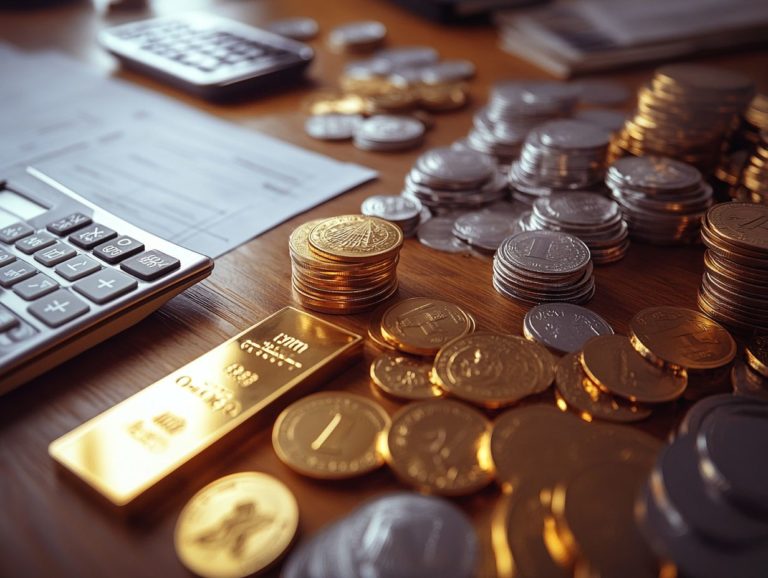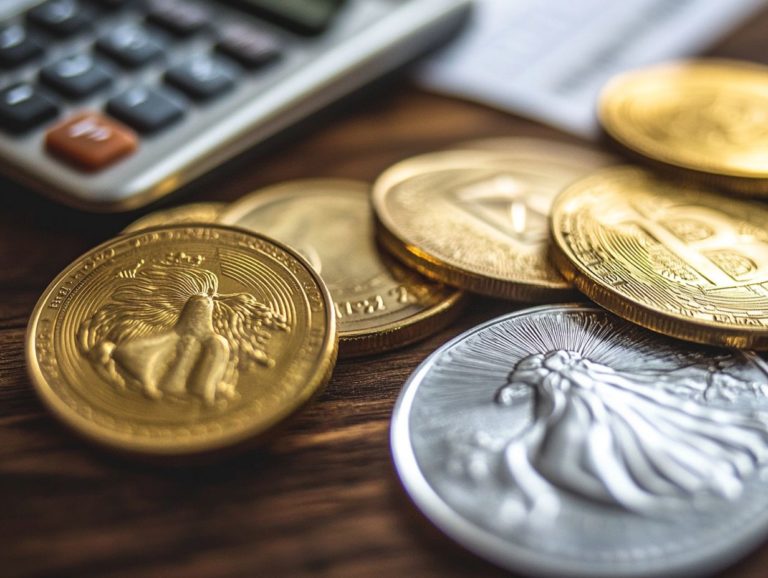Tax Strategies for Maximizing Returns in Precious Metals
Investing in precious metals can be an astute method for diversifying your portfolio, but understanding the tax implications is essential for optimizing your returns.
This guide will explore key strategies designed to enhance your profits while shedding light on the tax advantages associated with investments in precious metals. You ll also discover efficient ways to invest that can help minimize your tax burdens.
By the end, you ll have essential knowledge to act decisively in making informed financial decisions that align with your investment goals.
Contents
- Here are Your Key Takeaways!
- Maximizing Returns with Precious Metals Investments
- Tax Advantages of Precious Metals Investments
- Tax-Efficient Ways to Invest in Precious Metals
- Common Tax Mistakes to Avoid
- Frequently Asked Questions
- What are tax strategies for maximizing returns in precious metals?
- How can I maximize my profits from precious metals while minimizing taxes?
- What are some common tax deductions for precious metal investments?
- Can I defer taxes on my precious metal investments?
- What tax credits are available for investing in precious metals?
- Are there any tax implications for selling precious metals?
- How can I maximize my returns while minimizing taxes on precious metal investments?
Here are Your Key Takeaways!
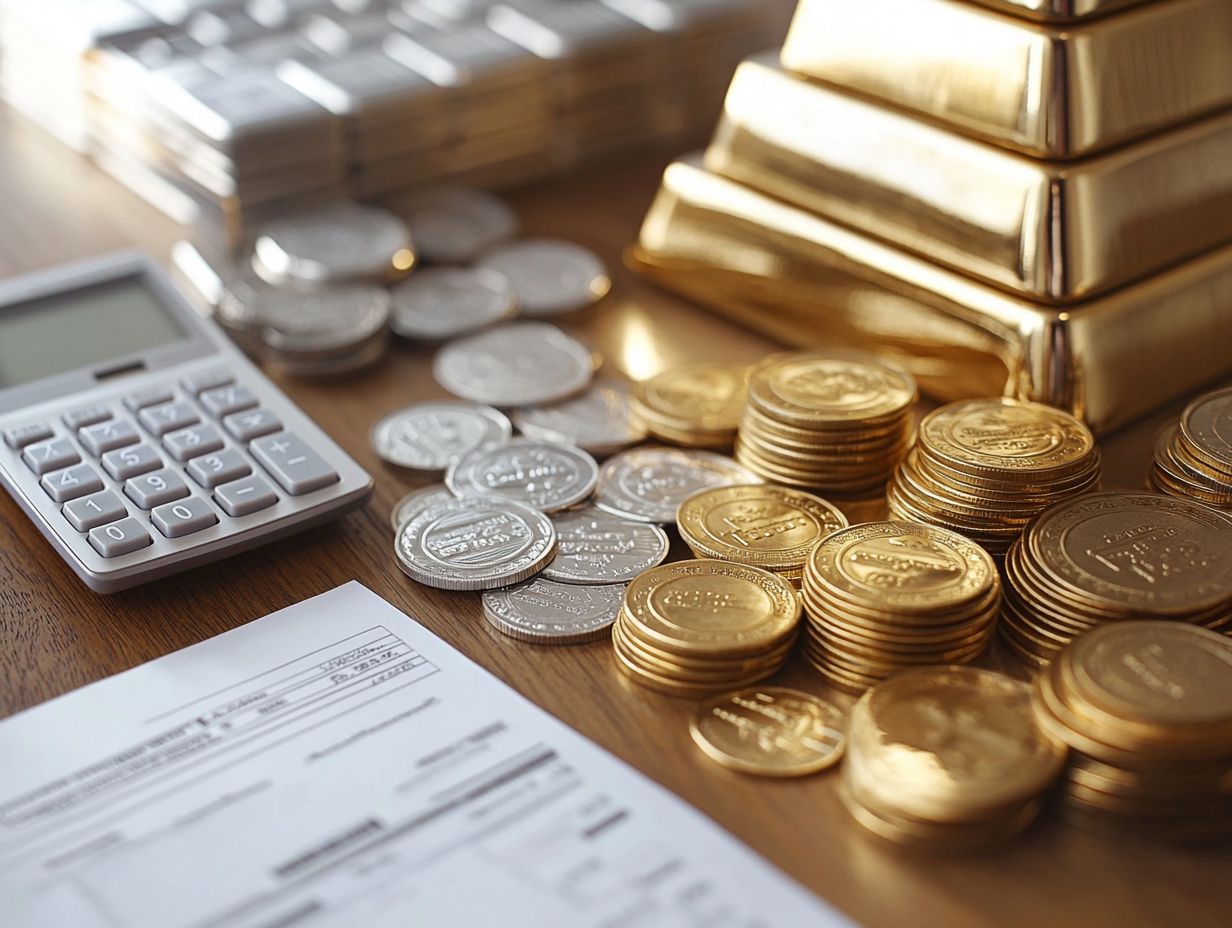
- Diversify your investment portfolio with precious metals to potentially reduce tax liability and increase returns.
- Consider tax-efficient investment options such as IRA or 401(k) rollovers to delay paying taxes on gains from precious metals.
- Avoid common tax mistakes by consulting with a knowledgeable tax professional and staying updated on tax laws and regulations.
Maximizing Returns with Precious Metals Investments
Investing in precious metals like gold and silver opens up exciting opportunities to enhance your returns while deftly navigating the intricacies of investment taxation and its implications.
These tangible assets serve not only as a safeguard against inflation but also as a means to diversify your portfolio, potentially boosting your profits from sales.
As you delve into market analysis, it s crucial to consult with a tax professional, ensuring that your investment strategies align with your financial goals and tax planning objectives.
Key Strategies for Increasing Profits
Implementing key strategies like selling losing investments to reduce taxes and effective timing can significantly boost your profits from precious metals investments, whether you hold them in an IRA or through LLCs.
For instance, knowing the optimal moments to buy or sell can be the defining factor between a profit and a loss. Your understanding of market trends is absolutely crucial.
Many investors discover that utilizing tax-advantaged accounts, such as IRAs, allows them to delay paying taxes on gains, which enhances their overall returns.
You can also employ selling losing investments to reduce taxes, which can help offset gains and lower your taxable income, especially in volatile markets.
Creating an LLC to manage your investments not only provides you with liability protection but can also streamline your tax management, opening up additional opportunities for wealth maximization.
Tax Advantages of Precious Metals Investments
Investing in precious metals presents a range of tax advantages that can significantly benefit discerning investors like yourself.
The way the IRS categorizes these assets as collectibles plays a crucial role in shaping your tax deductions and enhancing your overall returns.
This unique classification can provide you with strategic opportunities to optimize your investment outcomes.
How Precious Metals Can Reduce Tax Liability
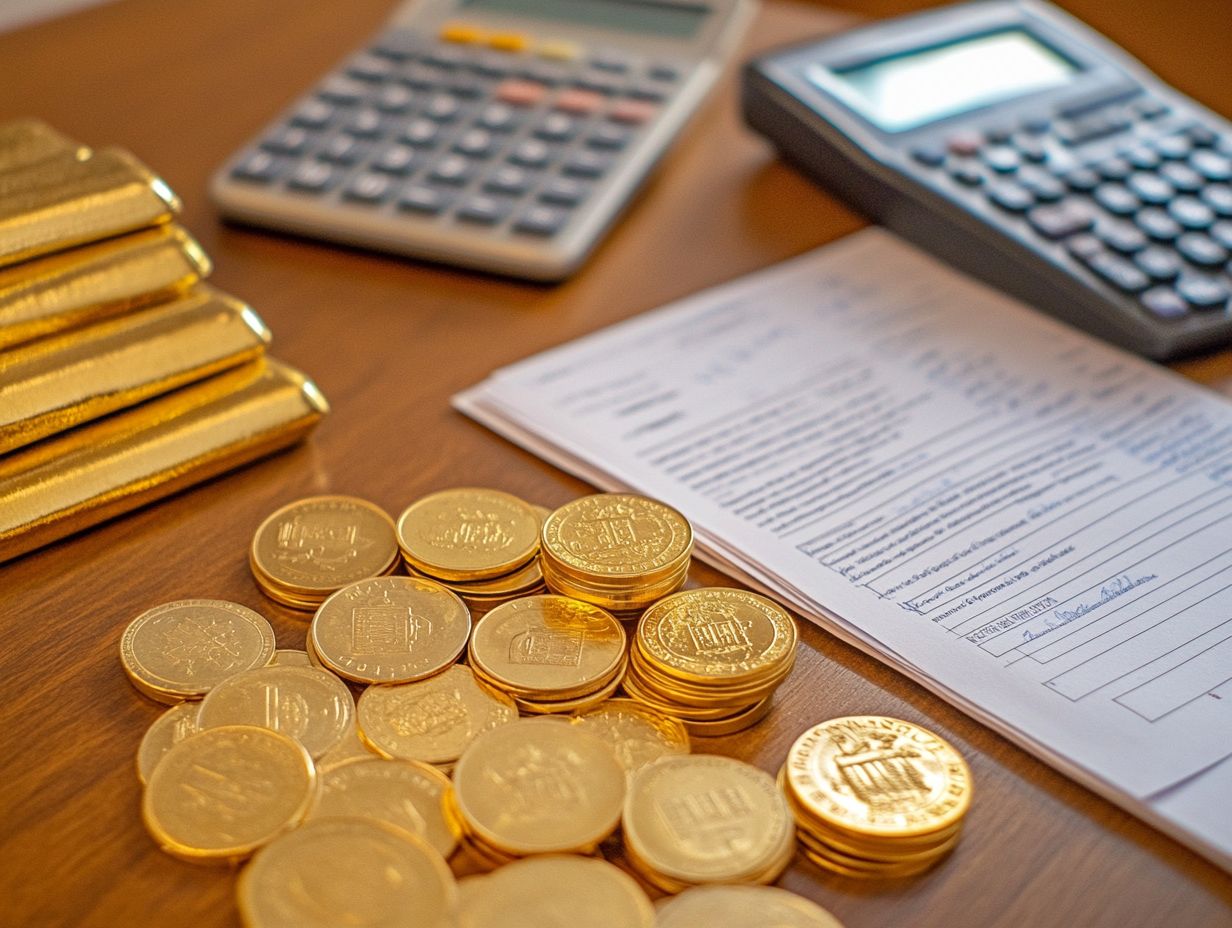
Precious metals can be a powerful ally in reducing your tax liability when you strategically invest in tax-advantaged accounts like IRAs and Roth IRAs, unlocking unique opportunities for profits from sales.
By leveraging these specialized accounts, you have the chance to defer or even eliminate capital gains taxes on your gold and silver profits until you make a withdrawal or, in the case of Roth IRAs, potentially never have to pay them at all.
These tax-advantaged structures allow your investments to appreciate without the immediate tax consequences that typically come with direct ownership.
This approach not only enhances the growth potential of your investments but significantly reshapes your overall financial landscape, making it easier to accumulate wealth over time while staying compliant with IRS regulations.
Account managers often offer valuable insights on optimal asset allocation, helping you maximize returns while minimizing tax burdens.
Tax-Efficient Ways to Invest in Precious Metals
Explore tax-efficient avenues for investing in precious metals. Using trusts and LLCs can greatly enhance your financial outcomes.
Options for Minimizing Tax Burden
To minimize your tax burden from precious metals investments, consult a tax professional. They can expertly guide you through effective timing strategies and available tax deductions.
Engaging a knowledgeable tax expert allows you to navigate the intricate landscape of tax regulations. They help you capitalize on every opportunity that comes your way. For instance, they might suggest holding your investments for over a year to benefit from lower capital gains rates. A tax professional can also pinpoint potential deductions, such as storage fees or shipping costs tied to your investments.
Stay informed about changes in tax legislation and collaborate closely with a professional. This will help you adopt tailored tax strategies for investing in precious metals ETFs that align with your financial objectives, ultimately reducing your taxable income and maximizing your net returns.
Common Tax Mistakes to Avoid
As an investor in precious metals, it’s crucial for you to recognize common tax pitfalls, especially regarding reporting profits from selling investments and the broader tax implications of your choices.
Consulting with a tax professional helps you navigate these complexities and mitigate potential issues.
Potential Pitfalls and How to Avoid Them
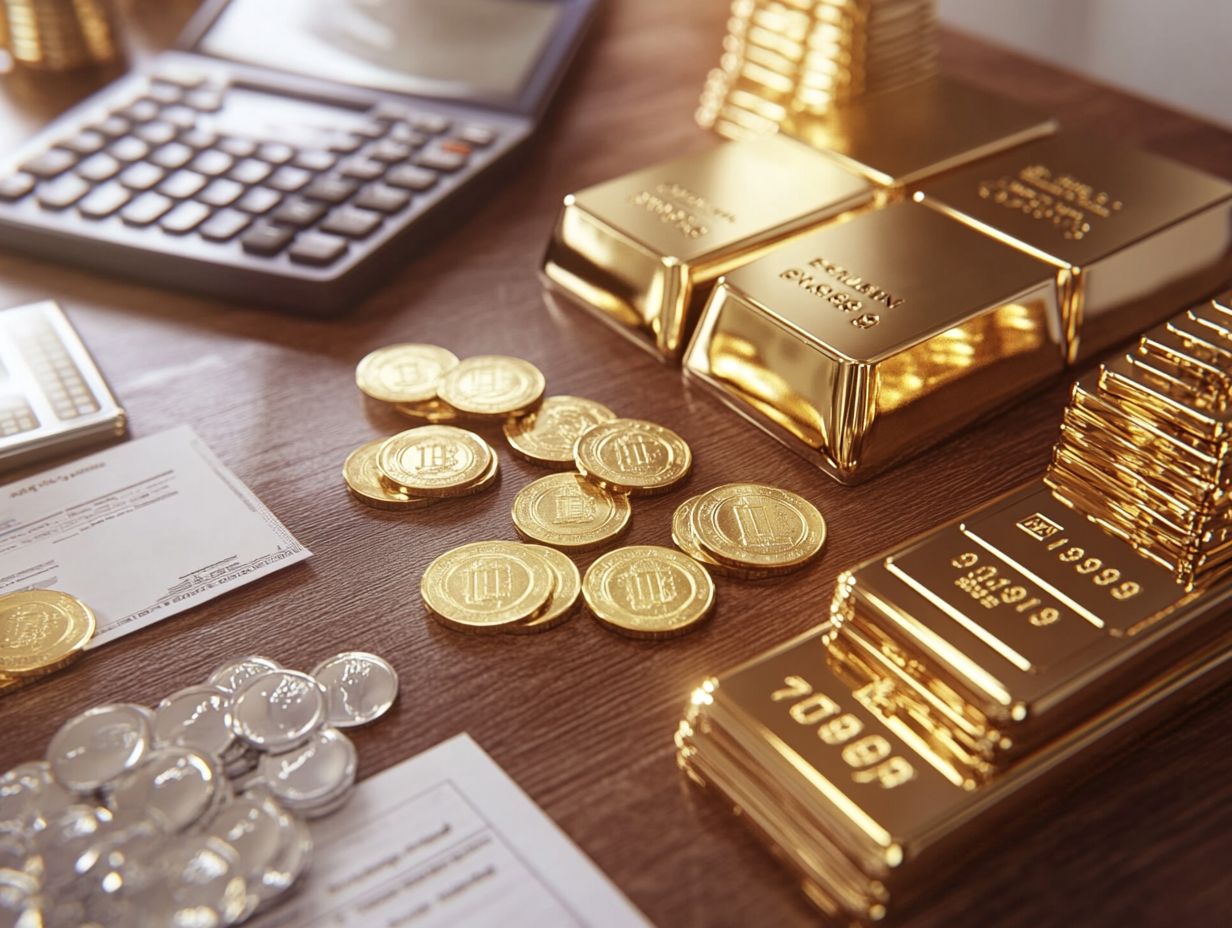
Understanding the pitfalls in investment taxation related to precious metals is vital. This is especially true when it comes to IRS compliance, tax deductions, and precise tax reporting.
Navigating this complex landscape requires awareness of the rules governing the buying, selling, and trading of metals like gold, silver, and platinum. Many investors underestimate the intricacies of capital gains tax implications. To avoid costly penalties, it’s crucial to be informed about tax strategies for precious metals in today’s market and ensure profits are reported accurately.
Prioritize thorough record-keeping and collaborate with tax professionals who specialize in precious metal investing. Staying informed about IRS regulations and understanding the tax consequences of trading precious metals will streamline compliance and optimize your financial outcomes.
Leveraging Tax Professionals for Optimal Results
Engaging tax professionals is crucial for you as an investor in precious metals. This ensures your tax planning is optimal and compliant with IRS regulations, ultimately helping to reduce your capital gains tax liabilities.
These experts possess a wealth of knowledge, guiding you through the intricate landscape of investment taxation. With their deep understanding of current tax laws and strategies, tax professionals are invaluable allies. They pinpoint potential deductions and credits that you might otherwise overlook. They assist in meticulously preparing tax documents and offer strategic advice on timing your sales effectively to minimize tax burdens.
When selecting the right tax professional, find someone with specialized experience in precious metals, excellent communication skills, and a proven track record in managing clients’ portfolios in a tax-efficient manner. Your investment deserves nothing less.
Frequently Asked Questions
What are tax strategies for maximizing returns in precious metals?
Tax strategies for maximizing returns in precious metals involve taking advantage of tax deductions, deferrals, and credits to reduce your overall tax burden and increase your profits from investing in precious metals.
How can I maximize my profits from precious metals while minimizing taxes?
Utilize tax professionals to identify strategies that align with your financial goals, ensuring you take full advantage of deductions and credits available to you.
What are some common tax deductions for precious metal investments?
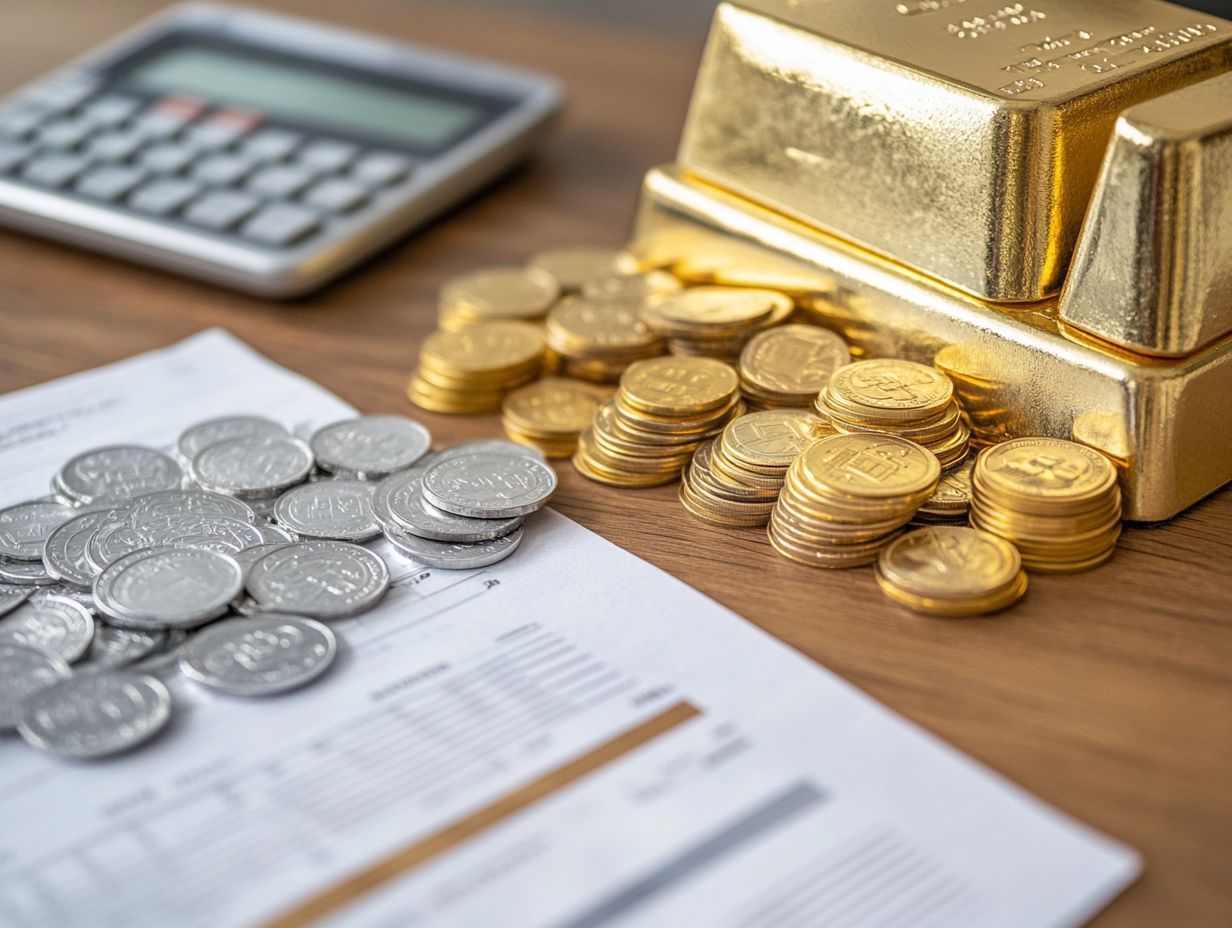
Tax deductions can help reduce your costs. These may include expenses for buying, storing, and selling precious metals, such as transaction and storage fees.
Can I defer taxes on my precious metal investments?
Yes, you can delay taxes on your precious metal investments. You can do this with retirement accounts like a self-directed IRA. This account lets you invest in real precious metals and grow your money without paying taxes right away.
What tax credits are available for investing in precious metals?
Investors may qualify for a tax credit when they invest in certain precious metals. For example, American Eagle coins are considered legal tender and qualify for a special tax credit.
Are there any tax implications for selling precious metals?
Yes, selling precious metals might lead to capital gains taxes. The amount depends on how long you hold the asset and your profits. Holding it for over a year usually means lower long-term tax rates.
How can I maximize my returns while minimizing taxes on precious metal investments?
Want to boost your returns? Consider using a tax-sheltered account like a Roth IRA. You’ll enjoy tax-free growth and withdrawals.
Also, carefully plan your sales to benefit from lower tax rates. You can even offset gains with losses from other investments.











